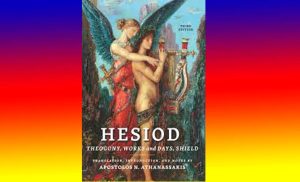Works and Days | Hesiod | A Review
Works and Days Hesiod A Review
Works and Days by Hesiod-A Review
Introduction:
‘Works and Days’ is a didactic poem attributed to the ancient Greek poet Hesiod, believed to have been composed around the 7th or 8th century BCE. This work is considered one of Hesiod’s two major surviving works, the other being ‘Theogony’. ‘Works and Days’ serves as a unique blend of didactic advice, moral guidance, agricultural wisdom, and mythological narratives. It is structured in the form of a conversation between Hesiod and his brother Perses, providing insights into the poet’s worldview and offering a comprehensive understanding of ancient Greek society.
Content and Themes:
Agricultural Wisdom and Practical Advice: Central to the poem is Hesiod’s emphasis on the importance of agricultural labor and responsible stewardship of the land. He provides practical advice on the timing of various agricultural tasks, such as plowing, sowing, and harvesting, based on the observation of natural phenomena and the changing seasons. This agricultural guidance highlights the connection between human endeavors and the cycles of nature.
Moral and Ethical Reflections: ‘Works and Days’ delves into moral conduct and ethical behavior. Hesiod imparts lessons on justice, honesty, and the avoidance of greed and dishonesty. He criticizes those who engage in wrongful deeds, such as stealing and lying, and encourages virtue and integrity.
Mythological Elements: The poem incorporates several mythological narratives that serve as allegorical lessons. The myth of Prometheus, for example, explores the theme of divine punishment for transgressing boundaries. The myth of Pandora’s box is used to illustrate the consequences of human curiosity and the emergence of evil into the world. These myths not only entertain but also educate readers about the potential repercussions of their actions.
Economic and Social Context: ‘Works and Days’ sheds light on the socio-economic conditions of ancient Greece. Hesiod addresses his brother Perses’ unjust acquisition of their inheritance, revealing societal issues related to property rights, inheritance disputes, and the exploitation of the poor. This context adds depth to the poem’s advice on honest labor and responsible use of resources.
Divine Justice and Order: The poem discusses the concept of divine justice and the role of the gods in human affairs. Hesiod portrays Zeus as a god who upholds justice and punishes wrongdoers. This theme underscores the importance of adhering to moral principles in both personal and communal contexts.
Work and Leisure: Hesiod contrasts the virtues of industriousness and hard work with the vices of idleness and excessive leisure. He cautions against laziness and encourages a balanced lifestyle that combines work with rest, underscoring the notion that productive labor leads to prosperity.
Cosmic Harmony and Chaos: Through its exploration of natural cycles and the order of the cosmos, the poem presents a worldview that emphasizes the cyclical nature of life. Hesiod portrays the world as a balance between chaos and order, reflecting the broader Greek belief in the interplay between chaos and cosmos.
Conclusion:
‘Works and Days’ by Hesiod stands as a remarkable literary and philosophical work that offers valuable insights into various aspects of ancient Greek life, from agriculture and ethics to mythology and justice. Hesiod’s didactic approach, interwoven with mythological narratives, creates a multi-layered text that continues to captivate readers, scholars, and enthusiasts of ancient literature. The poem’s relevance persists even today, serving as a timeless source of wisdom on human conduct, societal dynamics, and the harmonious relationship between humanity and the natural world. 0 0 0.
You May Like: The Aeneid by Virgil-A Review
N.B. The article originally belongs to the book entitled ‘The Reviews of Epic Literature Around the World Vol-II‘ by Menonim Menonimus.
Works and Days Hesiod A Review








